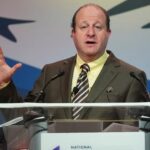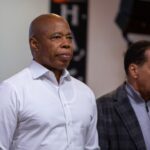
Former Federal Election Commission Chairman Bradley Smith has revealed the testimony he would have given in former President Donald Trump’s so-called “hush money” trial, had Judge Juan Merchan allowed it.
Smith was to testify for the defense earlier this week in the case brought by Manhattan District Attorney Alvin Bragg, but Trump’s attorneys decided to pull him when Merchan denied him the opportunity to address a question at the core of the case: Was the payment made to porn star Stormy Daniels a campaign contribution?
Keep in mind both the FEC and the Department of Justice had looked at the $130,000 payment made by then-Trump attorney Michael Cohen to Daniels and determined it wasn’t, at least with regard to the 45th president.
However, as part of a 2018 plea agreement, Cohen said he was guilty of campaign finance violations, in addition to tax evasion and making false statements to a bank to secure a home equity loan, according to a news release from the DOJ.
The supposed campaign finance violation appears to be an add-on as part of the efforts to “get Trump.” Legal experts, including Smith, don’t even believe the payment constituted a campaign contribution.
Trending:
Recall this was when the DOJ’s Russian hoax probe, led by special counsel Robert Mueller, was ongoing and people in the president’s orbit were being investigated and prosecuted left and right, like former campaign CEO Paul Manafort, former national security advisor Michael Flynn and former campaign advisor George Papadopoulos.
It seemed evident the DOJ was trying to get at least one of these guys, including Cohen, to flip on Trump and say he was guilty of some crime.
Getting Cohen to plead to campaign finance violations looked like the first step to charging Trump with the crime, but the FEC and the DOJ, after taking a close look, could not get there.
One reason was no doubt the result of former Democratic presidential candidate John Edwards’ case in 2012, when a jury found him not guilty of violating campaign finance law on one count and a mistrial on five others in relation to payments made to his pregnant mistress during the 2008 campaign.
Is Trump being persecuted?
Yes: 100% (78 Votes)
No: 0% (0 Votes)
Smith, who served as FEC chairman in 2004 and as a commissioner from 2000 to 2005, explained in a thread Monday on X, the day he was to testify for Trump in court, what he would have said.
First he noted that “Judge Merchan has so restricted my testimony that defense has decided not to call me. Now, it’s elementary that the judge instructs the jury on the law, so I understand his reluctance.
“But the Federal Election Campaign Act is very complex. Even [former Supreme Court Justice] Antonin Scalia—a pretty smart guy, even you hate him—once said ‘this [campaign finance] law is so intricate that I can’t figure it out,’” Smith wrote.
But the Federal Election Campaign Act is very complex. Even Antonin Scalia—a pretty smart guy, even you hate him—once said “this [campaign finance] law is so intricate that I can’t figure it out. /2
— Brad Smith (@CommishSmith) May 20, 2024
“While judge wouldn’t let me testify on meaning of law, he allowed Michael Cohen to go on at length about whether and how his activity violated FECA. So effectively, the jury got its instructions on FECA from Michael Cohen!” Smith added.
/7 but While judge wouldn’t let me testify on meaning of law, he allowed Michael Cohen to go on at length about whether and how his activity violated FECA. So effectively, the jury got its instructions on FECA from Michael Cohen!
— Brad Smith (@CommishSmith) May 20, 2024
He summarized, “So you’ve got a judge who contributed to Trump’s opponent presiding over a trial by a prosecutor who was elected on a vow to get Trump, for something DOJ and FEC chose not to prosecute, on a far-fetched legal theory … which the prosecution has been allowed to repeatedly misstate the law or elicit incorrect statements of law from witnesses (and unlike Cohen’s, my testimony would not have gone to the ultimate legal issue). The judge’s bias is very evident.”
/10… To repeatedly misstate the law or elicit incorrect statements of law from witnesses (and unlike Cohen’s, my testimony would not have gone to the ultimate legal issue). The judge’s bias is very evident.
— Brad Smith (@CommishSmith) May 20, 2024
He concluded, “Why do pluralities of Americans see Biden as a greater threat to democracy than Trump? It’s in part because of farces like this trial.”
On Tuesday, Smith added, “Bragg’s theory hinges on the claim that Trump tried to influence an election through ‘unlawful means.’ To do that, he’ll have to show that Trump violated the Federal Election Campaign Act. But since neither the FEC nor DOJ sued Trump, he’s got to show it on his own evidence.
“If that’s the case, isn’t it entirely relevant (not dispositive, but relevant) to the jury’s fact-finding on that question that neither DOJ nor FEC chose to prosecute? But Judge Merchan won’t allow that in,” Smith wrote.
If that’s the case, isn’t it entirely relevant (not dispositive, but relevant) to the jury’s fact-finding on that question that neither DOJ nor FEC chose to prosecute? But Judge Merchan won’t allow that in. /2
— Brad Smith (@CommishSmith) May 21, 2024
Fox News host Laura Ingraham replayed an interview Smith gave in March regarding Bragg’s case.
“Federal law does not say that anything that you think might help you win an election is a campaign expense. Rather, it’s an objective test, in which things like polling, paying for staff, paying for headquarters, paying for advertisements and so on — those are campaign expenses,” he said.
“That’s the problem that the DA has,” Smith continued. “He’s trying to allege that these payments to Stormy Daniels were campaign expenses, and I think, quite clearly, they exist from an obligation independent of Mr. Trump’s campaign for president.”
[embedded content]
In a Monday interview with the Washington Examiner’s Byron York, Smith said, “I can tell you my personal belief is that clearly paying hush money, or paying for a nondisclosure agreement, does not constitute a campaign expense.”
He offered the example of a businessman who decides he wants to run for office and his companies are facing some employee sexual harassment lawsuits.
Company lawyers advise him to go to court, because the cases are very winnable, but the businessman tells his lawyers to quietly settle the suits, because he does not want the bad press during his campaign.
He can’t use campaign funds to settle the lawsuits, because it’s against the companies. But he has decided to settle the cases because of his candidacy.
“It’s kind of similar to what went on here,” Smith contended, referring to Trump’s payment to Daniels, which was also not paid with campaign funds.
“So my personal belief is that this clearly would not have been a campaign expenditure, never had to be reported, and therefore was not misreported,” he said.
Hopefully, even a Manhattan jury will be able to see Merchan’s bias. Denying Smith the chance to meaningfully testify is just the latest example of trying to weigh the scales of justice against Trump.






